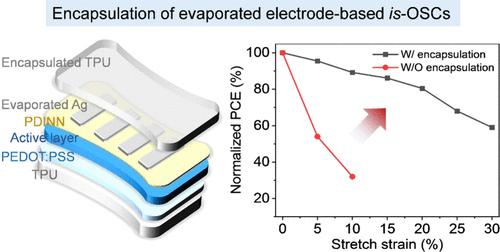Realization of Evaporated Electrode-Based Intrinsically Stretchable Ternary Organic Solar Cells through Encapsulation Strategy
IF 11.3
1区 化学
Q1 CHEMISTRY, PHYSICAL
引用次数: 0
Abstract
The mechanical properties of organic solar cells are of great importance to ensure their application in wearable or stretchable electronics. Here, we introduce polymer acceptor (N2200) into the active layer blend, and realize intrinsically stretchable organic solar cells (is-OSCs) with evaporated electrode via encapsulation strategy. The incorporation of N2200 simultaneously enhances the mechanical stretchability and PCE of is-OSCs, attributed to the enhanced polymer chain entanglement, and N2200 can act as tie molecules to provide electric connection among small molecule domains. More importantly, encapsulating the evaporated electrode-based is-OSCs leads to significant improvement in its mechanical stretchability, with 80% PCE retention under a large strain of 20%, compared to <2.5% strain for the unencapsulated ones. Additionally, encapsulated is-OSCs retained 67% PCE after 1000 test cycles at a stretch strain of 15%, whereas unencapsulated devices can only retain 33% PCE after 200 test cycles under a small strain of 5%.

通过封装策略实现基于蒸发电极的本征可拉伸三元有机太阳能电池
有机太阳能电池的机械性能对于确保其在可穿戴或可拉伸电子产品中的应用至关重要。在这里,我们在活性层混合物中引入了聚合物受体(N2200),并通过封装策略实现了带有蒸发电极的本征可拉伸有机太阳能电池(is-OSCs)。N2200 的加入同时增强了 is-OSC 的机械拉伸性和 PCE,这归功于聚合物链缠结的增强,并且 N2200 可以作为领带分子在小分子域之间提供电连接。更重要的是,封装蒸发电极基异构有机碳酸酯可显著改善其机械伸展性,在 20% 的大应变下可保持 80% 的 PCE,而未封装异构有机碳酸酯的应变仅为 2.5%。此外,封装的 is-OSC 在 15%的拉伸应变下经过 1000 次测试循环后可保留 67% 的 PCE,而未封装的器件在 5%的小应变下经过 200 次测试循环后只能保留 33% 的 PCE。
本文章由计算机程序翻译,如有差异,请以英文原文为准。
求助全文
约1分钟内获得全文
求助全文
来源期刊

ACS Catalysis
CHEMISTRY, PHYSICAL-
CiteScore
20.80
自引率
6.20%
发文量
1253
审稿时长
1.5 months
期刊介绍:
ACS Catalysis is an esteemed journal that publishes original research in the fields of heterogeneous catalysis, molecular catalysis, and biocatalysis. It offers broad coverage across diverse areas such as life sciences, organometallics and synthesis, photochemistry and electrochemistry, drug discovery and synthesis, materials science, environmental protection, polymer discovery and synthesis, and energy and fuels.
The scope of the journal is to showcase innovative work in various aspects of catalysis. This includes new reactions and novel synthetic approaches utilizing known catalysts, the discovery or modification of new catalysts, elucidation of catalytic mechanisms through cutting-edge investigations, practical enhancements of existing processes, as well as conceptual advances in the field. Contributions to ACS Catalysis can encompass both experimental and theoretical research focused on catalytic molecules, macromolecules, and materials that exhibit catalytic turnover.
 求助内容:
求助内容: 应助结果提醒方式:
应助结果提醒方式:


